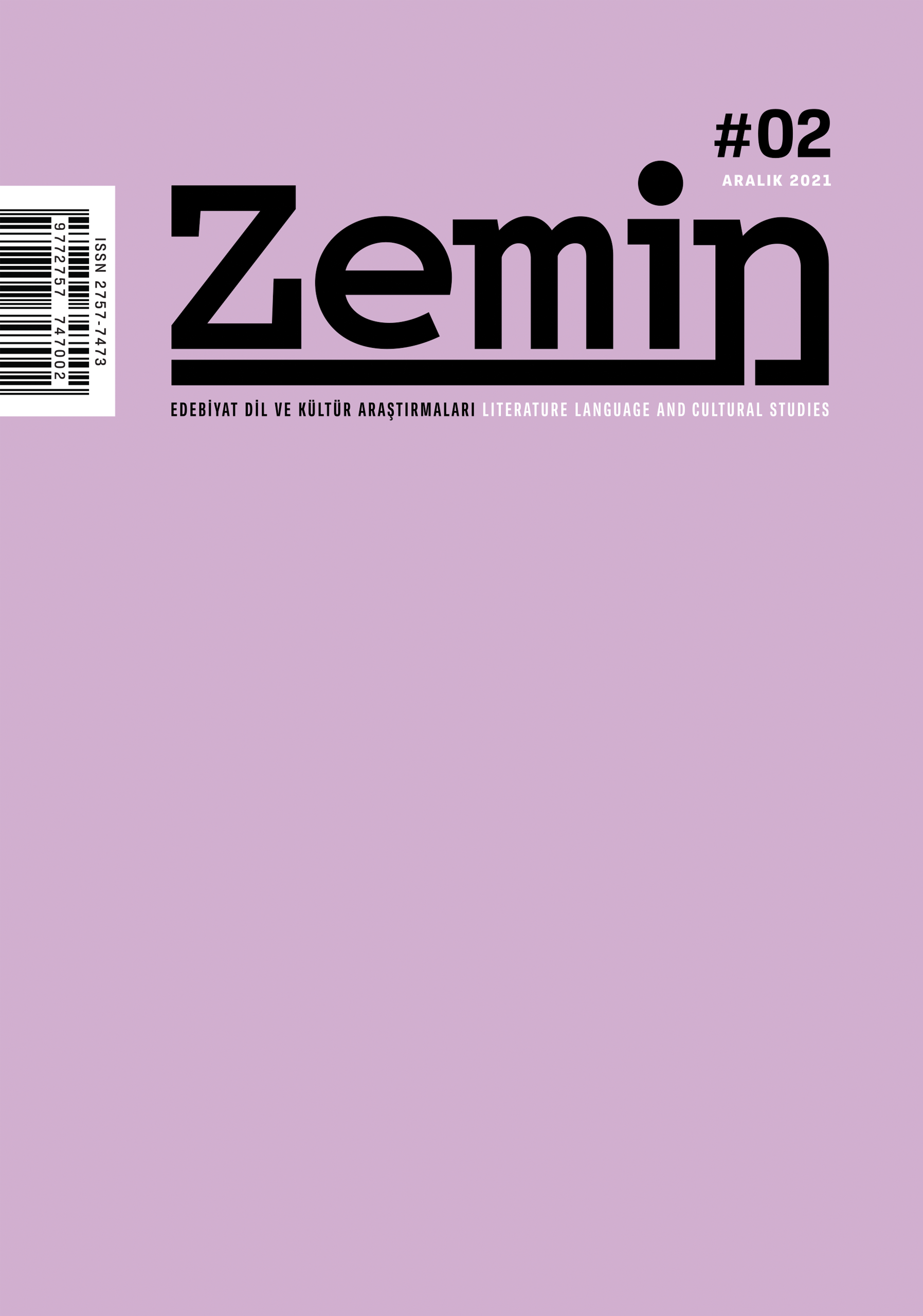The Concepts of Sakat, Özürlü and Engelli: Definitions and Differences
DOI:
https://doi.org/10.5281/zenodo.8017216Keywords:
sakat, özürlü, engelli, semantic merging, meaning differenceAbstract
Over the course of time, the differences in meanings among some words may become absorbed and as a result, some of the words may fall out of use. There are also cases where words get abandoned because their meanings make us uncomfortable. An example of this situation is the words sakat, özürlü and engelli. The word sakat, oftentimes avoided on the grounds that it contains a negative connotation, was replaced by the word özürlü. Yet, the word engelli subsequently was preferred over the word özürlü for the same reason. However, there was never a complete consensus on which of these words should be used and where they should be used. Indeed, current Turkish dictionaries assume that sakat, özürlü and engelli are equivalents for each other. Therefore, in this study, the words in question are defined in a way that reveals the differences in their meanings. This study asserts that sakat, özürlü and engelli are not different words expressing the same concept. In fact, these words are different concepts that emerge when the same issue is evaluated from different perspectives. Therefore, I argue that these concepts are not equivalent to each other, that it would be inadequate to choose one of these concepts instead of the other, and that each concept in question should be used in accordance with its own meaning.
References
Altun, Hilal Oytun. “Hakaret Anlamı Olmayan Kelimelerin Hakaret Amaçlı Kullanımı.” Acta Turcica Çevrimiçi Tematik Türkoloji Dergisi, s. 2/1 (2009): 1-15.
Atay, Hüseyin, İbrahim Atay ve Mustafa Atay. Arapça-Türkçe Büyük Lûgat. c. 2. Ankara: Hilâl Matbaası, 1968.
Atay, Hüseyin, İbrahim Atay ve Mustafa Atay. Arapça-Türkçe Büyük Lûgat. c. 3. Ankara, 1981.
Ayverdi, İlhan ve Ahmet Topaloğlu. Asırlar Boyu Târihî Seyri İçinde Misalli Büyük Türkçe Sözlük. c. 1. İstanbul: Kubbealtı, 2008.
Ayverdi, İlhan ve Ahmet Topaloğlu. Asırlar Boyu Târihî Seyri İçinde Misalli Büyük Türkçe Sözlük. c. 3. İstanbul: Kubbealtı, 2008.
Bezmez, Dikmen, Sibel Yardımcı ve Yıldırım Şentürk, ed. Sakatlık Çalışmaları: Sosyal Bilimlerden Bakmak. Çeviren Ferit Burak Aydar. İstanbul: Koç Üniversitesi, 2011.
Clauson, Gerard. An Etymological Dictionary of Pre-Thirteenth-Century Turkish. London: Oxford University Press, 1972.
Çağbayır, Yaşar. Orhun Yazıtlarından Günümüze Türkiye Türkçesinin Söz Varlığı: Büyük Türkçe Sözlük. c. 3. İstanbul: Ötüken - TİKA, 2016.
Çağbayır, Yaşar. Orhun Yazıtlarından Günümüze Türkiye Türkçesinin Söz Varlığı: Büyük Türkçe Sözlük. c. 7. İstanbul: Ötüken - TİKA, 2016.
Erbil-Erdugan, Fatma. Türkiye’de Özürlü Yoksulluğu ve Mücadele Politikalarının Değerlendirilmesi: Ankara-Keçiören Örneği. Ankara: Başbakanlık Özürlüler İdaresi Başkanlığı, 2010.
Eren, Hasan. Türk Dilinin Etimolojik Sözlüğü. Ankara, 1999.
al-Fīrūzābādī, Muḥammed. al-Uḳyānūsu’l-Basīṭ fī Tarcamati’l-Ḳāmūsi’l-Muḥīṭ. Çeviren Aḥmed ‘Āṣım. c. 2. İstanbul: Maṭba‘a-yı Baḥriyye, 1269 [1853].
İşler, Emrullah. “Türkçedeki Arapça Alıntı Kelimelerde Farsça Etkisi.” V. Uluslararası Türk Dil Kurultayı Bildirileri, c. 1. 1409-20. Ankara: Türk Dil Kurumu, 2004.
Jackson, Howard. Sözlükbilime Giriş. Çeviren Mehmet Gürlek ve Ellen Patat. İstanbul: Kesit Yayınları, 2016.
Kanun ve Kanun Hükmünde Kararnamelerde Yer Alan Engelli Bireylere Yönelik İbarelerin Değiştirilmesi Amacıyla Bazı Kanun ve Kanun Hükmünde Kararnamelerde Değişiklik Yapılmasına Dair Kanun, s. 6462, Resmî Gazete, s. 28636 (03 Mayıs 2013), https://www.resmigazete.gov.tr/eskiler/2013/05/20130503-1.htm.
M. Bahāe’d-dīn. Yeŋi Türkce Luġat. İstanbul: Evḳāf-ı İslāmiyye Maṭba‘ası, 1342.
Meḥmed Ṣalāḥī. Ḳāmūs-i ‘Osmānī: Türkcede Ḳullanılan ‘Arabī, Farsī, Ecnebī Kāffe-yi Luġātı Ḥāvīdür. c. 2. İstanbul: Maḥmūd Beg Maṭba‘ası, 1313 [1895-96].
Meḥmed Ṣalāḥī. Ḳāmūs-i ‘Osmānī - Türkcede Ḳullanılan ‘Arabī, Farsī, Ecnebī Kāffe-yi Luġātı Ḥāvīdür. c. 4. İstanbul: Maḥmūd Beg Maṭba‘ası, 1322 [1904-05].
Meninski, Francisci à Mesgnien. Thesaurus Linguarum Orientalium Turcicæ, Arabicæ, Persicæ / Lexicon Turcico-Arabico-Persicum. c. 2. Viennæ, 1680.
Mu‘īn, Muḥammed. Ferheng-i Fārsī. c. 1. Tahrān: İntişārāt-ı Edinā, 1381 [2002].
Mumcu, Hasan Erdem. Engelli Spor Politikaları. Ankara: Akademisyen Kitabevi, 2018.
Nişanyan, Sevan. Nişanyan Sözlük: Çağdaş Türkçenin Etimolojisi. İstanbul: Liber Plus, 2018.
Özgökçeler, Serhat ve Yusuf Alper. “Özürlüler Kanunu’nun Sosyal Model Açısından Değerlendirilmesi.” İşletme ve Ekonomi Araştırmaları Dergisi 1, s. 1 (2010): 33-54.
Redhouse, James William. A Turkish and English Lexicon / Kitāb-ı Ma‘ānī-yi Lehce. Constantinople, 1890.
Ş[emse’d-dīn] Sāmī. Ḳāmūs-i Türkī. c. 1. Dersa‘ādet: İḳdām Maṭba‘ası, 1317 [1899-1900].
Ş[emse’d-dīn] Sāmī. Ḳāmūs-i Türkī. c. 1 Dersa‘ādet: İḳdām Maṭba‘ası, 1318 [1900-01].
Şen, Mustafa. “Türkiye’de Engellilere Yönelik İstihdam Politikaları: Sorunlar ve Öneriler.” Sosyal Güvenlik Dergisi 8, s. 1 (2018): 129-52.
Şimşek, Kamuran. “Osmanlı Devleti’nde Engelliler için Kullanılan Tabir, Lakap ve Sıfatlar.” Belgi Dergisi 2, s. 15 (2018): 728-40.
Şişman, Yener. “Özürlülük Alanında Kullanılan Kavramlar Üzerine Genel Bir Değerlendirme.” Sosyal Politika Çalışmaları Dergisi 7, s. 28 (2012): 69-85.
et-Tebrizī, Muḥammed Ḥüseyn. Kitāb-ı Tibyān-ı Nāfi‘ der Terceme-yi Burhān-ı Ḳāṭi‘. Çeviren Aḥmed ‘Āṣım. Beldetü ’ṭ-Ṭayyibeti ’l-Ḳosṭanṭiniyye: Dārü ’ṭ-Ṭıbā‘ati’s-Sulṭāniyye, 1214 [1799].
Tekin, Talat. Türkoloji Eleştirileri. Ankara: Simug, 1997.
Tietze, Andreas. Tarihî ve Etimolojik Türkiye Türkçesi Lugati. c. 6. O-R. Ankara: Türkiye Bilimler Akademisi, 2018.
Tietze, Andreas. Tarihî ve Etimolojik Türkiye Türkçesi Lugati. c. 1. A-E. İstanbul: Simurg, 2002.
Tulum, Mertol. 17. Yüzyıl Türkçesi ve Söz Varlığı. Ankara: Türk Dil Durumu, 2011.
Turgay, Tacettin. “Semantics of Turkish Bare Nouns and the Function of Classifiers.” Turkic Languages 24, s. 1 (2020): 30-77.
Türkçe Sözlük. Ankara: Türk Dil Kurumu, 2011.
Yayla, Yasin. “Güncel Türkçe Sözlüklerde Arapça Asıllı Kelimeler için Kaynak Dil Olarak Farsça.” Zemin, s. 1 (2021): 176-95.
Yayla, Yasin. “Türkiye Türkçesinde Mana Birleşmesi Problemi: ‘Gaye’, ‘Hedef ’, ‘Maksat’, ‘Amaç’ Örneği.” RumeliDE Dil ve Edebiyat Araştırmaları Dergisi, s. 20 (2020): 145-56.
Yılmaz, Engin. Sözlük Bilimi Üzerine Araştırmalar. Ankara: Pegam Akademi, 2019.
Downloads
Published
How to Cite
Issue
Section
License
Copyright (c) 2022 Ensar Alemdar

This work is licensed under a Creative Commons Attribution 4.0 International License.



